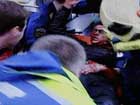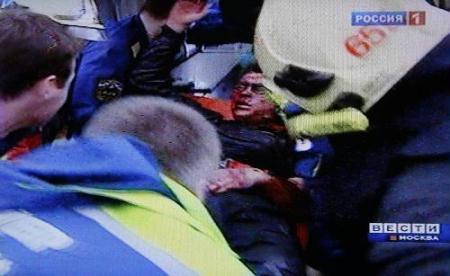| Videos | ? Latest |
|
? Feature | ? Sports | ? Your Videos |
38 killed in Moscow subway blasts

Female suicide bombers blew themselves up Monday in twin attacks on Moscow subway stations packed with rush-hour passengers, killing at least 38 people and wounding more than 60. Officials blame the carnage on rebels from the Caucasus region.
 |
|
Television grab shows rescuers carrying the wounded at a subway station in Moscow, March 29, 2010. Russian Emergency Situations Minister Sergei Shoigu said 37 people were killed and another 102 injured in the twin explosions that rocked central Moscow's subway stations early Monday. The blasts were confirmed as having been set off by two female suicide bombers who probably were linked to terrorist groups in North Caucasus. [Xinhua] |
Russian President Dmitry Medvedev laid flowers on Monday on the platform of a central Moscow metro station, one of the deadly scenes of the metro blasts, which took the lives of dozens of people during the morning rush hour.
The bombing turned the metro into the hell. Witnesses say the bombs were detonated as the trains pulled into the stations and the doors were opening.
Dmitry Medvedev said, "It's absolutely clear that actions were very well planned and banking on causing massive chaos. We need to conduct investigations and control the situation very strictly."
Russian Prime Minister Vladimir Putin visited victims of the Moscow bomb attacks on Monday evening breaking off a trip to Siberia.
Russian Prime Minister Vladimir Putin said, "I am sure our law enforcement agencies will do their best to find and punish the criminals. The terrorists will be destroyed."
The bombers have not been identified.
However the Federal Security Service said body fragments of the two bombers pointed to a Caucasus connection.
Insurgents from north Caucasus have conducted numbers of deadly attacks in Moscow. In August 2000 a bomb ripped through an underpass at the height of tourist season. While in February 2004, a suicide bomber killed at least 39 people and wounded more than 100.
 0
0 






